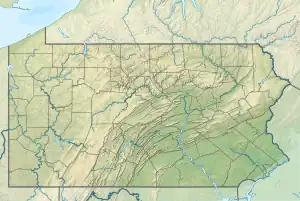| Raystown Branch Juniata River Tributary to Juniata River | |
|---|---|
 Raystown Lake Dam on the Raystown Branch Juniata River | |
 Location of the mouth of Raystown Branch Juniata River | |
| Location | |
| Country | United States |
| State | Pennsylvania |
| Counties | Huntingdon County Bedford County |
| Physical characteristics | |
| Source | divide between Raystown Branch and Wills Creek |
| • location | about 1 mile east of Macdonaldton, Pennsylvania |
| • coordinates | 39°54′57″N 078°53′00″W / 39.91583°N 78.88333°W[1] |
| • elevation | 2,720 ft (830 m) |
| Mouth | Juniata River |
• location | Ardenheim, Pennsylvania |
• coordinates | 40°27′17″N 077°58′39″W / 40.45472°N 77.97750°W[1] |
• elevation | 600 ft (180 m) |
| Length | 62.14 mi (100.00 km)[2] |
| Basin size | 961.96 square miles (2,491.5 km2) |
| Discharge | |
| • location | Ardenheim, Pennsylvania |
| • average | 1,233.99 cu ft/s (34.943 m3/s) at mouth with Juniata River[3] |
| Basin features | |
| Progression | generally north |
| River system | Juniata River |
| Tributaries | |
| • left | Breastwork Run Shawnee Branch Dunning Creek Pipers Run Yellow Creek Dry Run Ravers Run Sugar Camp Run Shy Beaver Creek Coffee Run James Creek Hawns Run |
| • right | Wambaugh Run Cove Creek Brush Creek Tub Mill Run French Run Kimber Run Six Mile Run Shoup Run Tatman Run Great Trough Creek |
| Waterbodies | Raystown Lake |
The Raystown Branch Juniata River is the largest and longest tributary of the Juniata River in south-central Pennsylvania in the United States.[4]
The Raystown Branch Juniata River begins along the Allegheny Front in Somerset County and flows 123 miles (198 km) to the confluence with the Juniata River near Huntingdon.[5] It passes through the boroughs of Bedford and Everett along its course.
Approximately 5.4 miles (8.7 km) upstream of the mouth, the United States Army Corps of Engineers Raystown Dam forms Raystown Lake, the largest lake in Pennsylvania.[4]
Bridges
- The Diehls Covered Bridge crosses Raystown Branch Juniata River in Harrison Township, Pennsylvania.[6]
- The Bridge in Snake Spring Township crosses Raystown Branch Juniata River in Snake Spring Township, Pennsylvania.[7]
- The Corbin Bridge crosses Raystown Branch Juniata River in Juniata Township, Pennsylvania.[8]
Tributaries
(Heading downstream)
- Breastwork Run
- Dunning Creek
- Cove Creek
- Bloody Run
- Brush Creek
- Yellow Creek
- Great Trough Creek
See also
References
- 1 2 "GNIS Detail - Raystown Branch Juniata River". geonames.usgs.gov. US Geological Survey. Retrieved 19 July 2019.
- ↑ "ArcGIS Web Application". epa.maps.arcgis.com. US EPA. Retrieved 19 July 2019.
- ↑ "Raystown Branch Juniata River Watershed Report". Waters Geoviewer. US EPA. Retrieved 19 July 2019.
- 1 2 Gertler, Edward. Keystone Canoeing, Seneca Press, 2004. ISBN 0-9749692-0-6
- ↑ U.S. Geological Survey. National Hydrography Dataset high-resolution flowline data. The National Map, accessed August 8, 2011
- ↑ "National Historic Landmarks & National Register of Historic Places in Pennsylvania" (Searchable database). CRGIS: Cultural Resources Geographic Information System. Note: This includes Susan M. Zacher (December 1977). "National Register of Historic Places Inventory Nomination Form: Diehls Covered Bridge" (PDF). Retrieved 2011-11-19.
- ↑ "National Historic Landmarks & National Register of Historic Places in Pennsylvania" (Searchable database). CRGIS: Cultural Resources Geographic Information System. Note: This includes J. Dain Davis (September 1982). "National Register of Historic Places Inventory Nomination Form: Bridge in Snake Spring Township" (PDF). Retrieved 2011-11-19.
- ↑ "National Historic Landmarks & National Register of Historic Places in Pennsylvania" (Searchable database). CRGIS: Cultural Resources Geographic Information System. Note: This includes Deborah L. Suciu (September 1989). "National Register of Historic Places Inventory Nomination Form: Corbin Bridge" (PDF). Retrieved 2011-11-05.
External links
Wikimedia Commons has media related to Raystown Branch Juniata River.
This article is issued from Wikipedia. The text is licensed under Creative Commons - Attribution - Sharealike. Additional terms may apply for the media files.





